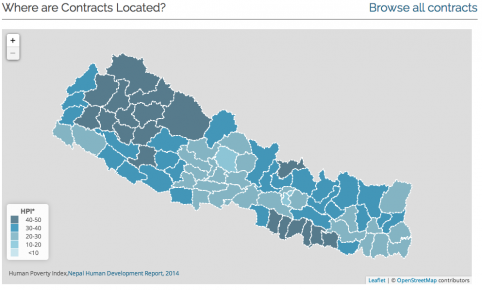“If your mother gives you $10 to go to the store to buy a bottle of milk, you have to show her, 'Here is the milk and here is the change.' Likewise, we are obliged to show taxpayers exactly what we are doing with their money.”
- Paca Zuleta, the general director at Colombia’s public procurement agency, as told to Thomson Reuters
Government procurement accounts for approximately $9.5 trillion in annual spending worldwide. Put another way, government procurement is more than 10 percent of the global economy. Evidence suggests that in countries as diverse as Indonesia, Tanzania, Mexico and Mongolia, more than 75 percent of citizens want their governments to be more open with this kind of data. Yet information about public procurement can be extremely difficult for citizens, civil society and other stakeholders to access. As a result, the Open Contracting Partnership was formed to make procurement information more open, accessible and actionable, and the global movement toward procurement transparency is gaining momentum. AidData is actively engaged in moving this Open Contracting agenda forward.
Last month, AidData welcomed the release of the Open Contracting Data Standard (OCDS), which holds tremendous promise for helping governments, donors and private sector more easily and effectively publish procurement information. And we are already working to help our government partners put these OCDS principles into practice:
Over the past year, the Open Aid Partnership, AidData and the Government of Nepal’s Public Procurement Monitoring Office (PPMO) have worked on an initiative to use Open Contracting principles to “open up” government procurement data in Nepal. Our effort culminated with an “Open Contracting for Open Development” workshop in late September, which explored how OCDS principles can improve public spending, accountability, citizen participation and development effectiveness in Nepal. More than 55 participants from government agencies, donors, leading civil society organizations, media and the private sector attended the workshop. During the event, OAP partners AidData and Open Nepal presented the results of the pilot effort to “open up” information from over 5,000 public contracts. A public Open Contracting dashboard hosted by Open Nepal is available here.

Open Nepal's Open Contracting Dashboard
Participants at the workshop provided rich examples of why procurement transparency matters to them. Representatives from civil society highlighted the opportunity to “watch the good and ills of development projects and possibly correct them.” A member of the private sector stated that the value from their perspective is to “visualize the real-time situation of public procurement” and use this information to plan for business expansion. The government officials present saw value in this data for developing new policies, sector strategies and procurement plans, as well as monitoring and “analyzing about the use of aid money.” The feedback we’ve received to date suggests that government agencies and local citizens are likely to be the primary users of open data about public procurement. CSOs and contractors are also important users, as are development partners, the media and academia. Our goal at AidData is to make sure that these important users can get maximum value from the Open Contracting movement.
At the conclusion of the Open Contracting for Open Development effort, we made a number of recommendations to the Government of Nepal for incorporating Open Contracting principles into internal systems and processes. Since these recommendations will be broadly useful to other government who are implementing OCDS, we’ll share an abbreviated version in the next post in this series on open contracting (the first post in the series is available here). Stay tuned.

